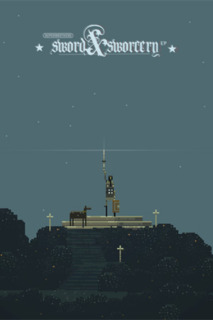S:S&SEP is an adventure game that eschews compelling gameplay in favor of quirky humor and audiovisual pizazz
As it happens, everything about the game is tongue-in-cheek, and S:S&SEP often gets lost in its own witticisms. Like someone that laughs at their own jokes, it finds itself so clever that the developer felt it necessary to integrate Twitter functionality so that you might Tweet its script at any time. You will either find this whimsical and cute or insufferably pretentious.
This is not to say that the narrative is lost or the game unplayable. You are compelled to move forward due to the pressing nature of your quest. Your woeful errand takes you through ancient ruins, dark forests, across a vast ocean, to the top of a mountain, and even into the heart of a gigantic tree. You will feel as though you are on an adventure in a strange land, with rolling waterfalls, arcing rainbows, thundering storms, and woodland creatures grazing in the forest that scamper away at your approach. Then - without warning - an evil spirit appears and threatens to cut-short your adventure. It gives the game an edge and presses the player onward. Capybara Games does an excellent job of creating an alternate world. If only it all weren't so blurry.
The feeling is akin to looking through a lens out-of-focus. It's pixelart, meant to evoke nostalgia for the Atari and 8-bit eras, but the Scythian's hands look like potatoes. It's often hard to tell what is happening at all.When she performs her "Sworcery" is she holding two candles? Are those her fingers? Who knows; the chunky, pixelated art is a deliberate design choice and something gamers will ultimately think wonderful or annoying.
The score is just the opposite of S:S&SEP's visual art direction: Focused and clear, compelling and moving, atmospheric and haunting. Every chase scene, dream sequence, and boss battle are given weight and tension by Musician Jim Guthrie's score. Guthrie plays a supporting role in-game as well, both figuratively and literally, which is difficult to describe without spoiling later sections of the game. Suffice to say, you will either smile to yourself at its randomness, or roll your eyes at its "look, I'm so clever!" quirkiness.
While many of the aesthetic decisions are something loved or hated, the PC controls are decidedly annoying. S:S&SEP is point-and-click, and not in a quaint, Sierra Quest adventure game way, but in a adapted from a tablet way. You click, double-click, or click and hold to do everything in the game. If you need to move somewhere you click twice, or hold down the left-mouse button and the Scythian follows your cursor. You click on object environmentals to interact with them. Clicking a bush or tree causes leaves to rustle, the water in the lake to splash, or a sheep to look up from its grazing.
It's impossible to miss that S:S&SEP is ported from a touch-screen device, as a result. Many puzzles require that you "rub" and "touch." Combat involves clicking on one of two buttons that would be much more intuitive on a tablet, or if commands had been mapped to actual keyboard buttons. In fact, S:S&SEP might be the first game where you lament the lack of a touch-screen because it would be so much more intuitive.
Despite some annoying control decisions, the puzzles are all relatively easy to solve. If you stumble, have difficulty determining which way to go, or fail at a particular combat juncture, the game provides a narrative to guide the player. There are, however, times when the game provides zero guidance at certain critical junctures, or where its too clever for itself and the clue is lost in the game's own humor.
There are other times S:S&SEP's wit not only feels forced, but interferes with progression. The game is impossible to complete in a single sitting because it is artificially gated by the phases of the moon in the real world. In order to progress the player must wait until either the moon is in the proper phase or manually adjust their computer's clock, in which case the game becomes impossible to "complete," meaning a 100% completion rate as measure by the game itself.
If every annoyance and complaint were instead a more subtle accent to its narrative, S:S&SEP would indeed be mirthful. Instead, its overbearing quirkiness becomes more forced than a Zooey Deschanel sitcom. A giant record looms in the sky for no particular reason. An unidentifiable creature is dancing naked in the woods. A dog gives you directions.
Further, you have to backtrack frequently because, though the narrative is straightforward if you knew where you had to go next, it is not often clear to where you are supposed to be headed. The game provides hints, but the hints are often designed to be clever- but not necessarily clever to the gamer so much as the creator. This might not be so bad if your character could instantly move or even run from screen entrance to exit, but you are forced to watch the Scythian powerwalk from one side of the screen to another, even though you might need to be several screens away to progress. There will often be no change in scenery or combat to break up the extended stroll, either.
All of this compounds to make S:S&SEP an ugly, pretentious, "I'm so funny and clever," exercise in poorly adapted controls and muddy graphics for the sake of art and silliness. The adventure has whimsy, certainly, but it is difficult to forgive all its shortcomings in order to enjoy yourself.

